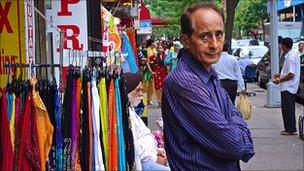Immigrants offer US cities scope for new growth
- Published
In the aftermath of an economic recession, the entrepreneurial spirit of many immigrants to the US has caught the attention - and now the financial support - of cities looking for new ways to grow.
In the Queens neighbourhood of New York City, Finnish bread baker and immigrant Simo Kuusisto and his two colleagues are busy. They have 10 hours booked in the Entrepreneur Space community kitchen and need to bake 2,000 small rounds of Finnish rye bread before they leave.
"You can come and rent this space as you need so you don't have high overhead [costs]. There is very small financial risk involved," says Mr Kuusisto, who did not have the money to buy his own industrial oven.
The commercial kitchen, which can be booked by the hour, has allowed him and many other food entrepreneurs from abroad to grow their business and that is why it will soon receive additional funding from the city government.

New York's Queens borough is home to a wide variety of foreign-born business owners
Earlier this year, New York Mayor Michael Bloomberg announced a number of initiatives that are intended to help immigrant-owned enterprises get started and grow, among them a business plan competition and free business courses in Chinese, Korean, Spanish and Russian.
"We need the federal government to fix our immigration system, but New York City can't afford to wait," Mr Bloomberg said in a press release.
In New York, immigrants represent 49% of self-employed workers.
Nationwide they are twice as likely to start a business, according to the Kauffman Index of Entrepreneurial Activity. But, Mr Bloomberg said, they are also more likely to see their business fail within three-and-a-half years than native-born entrepreneurs.
'Sea change'
Jonathan Bowles, director of the Center for an Urban Future, calls the newly sparked political interest in immigrant entrepreneurs a "sea change".
"A lot of these old north-eastern cities are looking for some kind of answer and for a while these cities were embracing artists and bio tech, but immigrants were hiding in plain sight. They didn't get a lot of attention," says Mr Bowles, who published a report about the impact of immigrant-owned businesses on US cities in 2007.
Over the past decade, the states experiencing the largest increases in entrepreneurial activity were Georgia, Nevada and Tennessee, according to the Kauffman Index.
All three states saw their Hispanic population rise by more than 80% as well, according to newly released US Census data.
Experts agree that the hotly contested national immigration debate has made it tougher for foreign-born entrepreneurs to establish themselves and for local leaders to come up with supportive solutions.
"You are seeing more states and local entities saying the feds abandoned the fields but we have got to fend for ourselves," says Richard Herman, an immigration attorney in Cleveland and co-author of the book Immigrant, Inc.
"Toronto looked like Cleveland 40 years ago, now it's a global Mecca. And it's not an accident that it's 50% foreign-born."
Urban revival
Former "rust belt" cities like Cleveland are partnering up with Pittsburgh and Detroit to create a regional centre for the immigrant investor visa program EB-5.
In those regions, immigrants can obtain a green card by investing $500,000 (£304,000) and creating 10 new jobs in an economically distressed area.
With a population loss of 25% in 10 years and the decline of the local car industry, Detroit fits the "economically distressed" label. Even immigrants without the financial resources to invest hundreds of thousands of dollars can play a big role in the revival of a city.
"Urban retail thrives with ethnic immigrants who are willing to invest in areas with unstable demand. Detroit has a lot of low-cost property which is a great opportunity for immigrants," says Steven Tobocman, who leads the Global Detroit study, external, an initiative which looks at how the region can profit from foreign-born talent.
The problem for immigrant businesses has always been getting to the next level, explains Mr Bowles, citing lack of financing and space in densely populated communities like Queens, in New York.
That is why the Entrepreneur Space community kitchen is an optimal solution for Mr Kuusisto at the moment, but only the beginning in his quest to sell his Finnish rye bread across the country.
"This is the first step and the next step is to move forward and have our own bakery," he says.
- Published30 March 2011
- Published1 April 2011